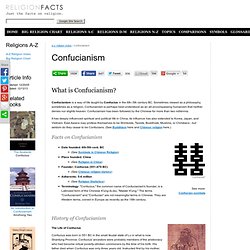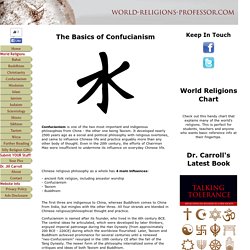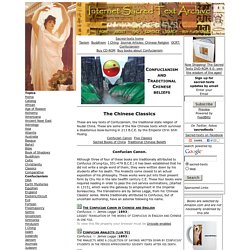

Confucianism. Confucianism. 396Google + Confucianism is a way of life taught by Confucius in the 6th–5th century BC.

Sometimes viewed as a philosophy, sometimes as a religion, Confucianism is perhaps best understood as an all-encompassing humanism that neither denies nor slights heaven. Confucianism has been followed by the Chinese for more than two millennia. It has deeply influenced spiritual and political life in China; its influence has also extended to Korea, Japan, and Vietnam. East Asians may profess themselves to be Shintoists, Taoists, Buddhists, Muslims, or Christians - but seldom do they cease to be Confucians. Facts on Confucianism Date founded: 6th-5th cent. History of Confucianism The Life of Confucius Confucius was born in 551 BC in the small feudal state of Lu in what is now Shantung Province. See Confucian symbols here Confucius had served in minor government posts managing stables and keeping books for granaries before he married a woman of similar background when he was 19. Confucianism Recommended: Confucianism Origins, Confucianism History, Confucianism Beliefs.
Some say Confucianism is not a religion, since there are no Confucian deities and no teachings about the afterlife.

Confucius himself was a staunch supporter of ritual, however, and for many centuries there were state rituals associated with Confucianism. Most importantly, the Confucian tradition was instrumental in shaping Chinese social relationships and moral thought. Thus even without deities and a vision of salvation, Confucianism plays much the same role as religion does in other cultural contexts. The founder of Confucianism was Kong Qiu (K'ung Ch'iu), who was born around 552 B.C.E. in the small state of Lu and died in 479 B.C.E. The Latinized name Confucius, based on the honorific title Kong Fuzi (K'ung Fu-tzu), was created by 16th-century Jesuit missionaries in China. The Basics of Confucianism. Confucianism is one of the two most important and indigenous philosophies from China - the other one being Taoism.

It developed nearly 2500 years ago as a social and political philosophy with religious overtones, and came to influence Chinese life and practice arguably more than any other body of thought. Even in the 20th century, the efforts of Chairman Mao were insufficient to undermine its influence on everyday Chinese life. Chinese religious philosophy as a whole has 4 main influences: - ancient folk religion, including ancestor worship- Confucianism- Taoism- Buddhism The first three are indigenous to China, whereas Buddhism comes to China from India, but mingles with the other three.
Confucianism is named after its founder, who lived in the 6th century BCE. Certain fundamental concepts in Chinese religion are shared by both Confucianism and Taoism. . - the Tao, or the Way - the polarity of Yin and Yang - the quest for harmony Do You Have Pictures to Share of Sacred Spaces? Confucian Documents. Sacred-texts home Taoism Buddhism I Ching Journal Articles: Chinese Religion OCRT: ConfucianismBuy CD-ROM Buy books about Confucianism These are key texts of Confucianism, the traditional state religion of feudal China.

These are some of the few Chinese texts which survived a disasterous book-burning in 213 B.C.E. by the Emperor Ch'in Shih Huang. Confucian Canon Five ClassicsSacred Books of China Traditional Chinese Beliefs Confucian Canon. Although three of four of these books are traditionally attributed to Confucius (K'ung-tzu, 551-479 B.C.E.) it has been established that he did not write a single word of them; they were written down by his students after his death. The Confucian Canon in Chinese and EnglishConfucius, tr. Confucian Analects (Lun Yü)Confucius, tr. MenciusMencius, tr. The Great Learning (Ta Hsüeh)Confucius*, tr. The Doctrine Of The Mean (Chung Yung)Confucius*, tr. The Sacred Books of China Additional translations The Book of Odes by L.
The Five Classics The Li Ki Part I.